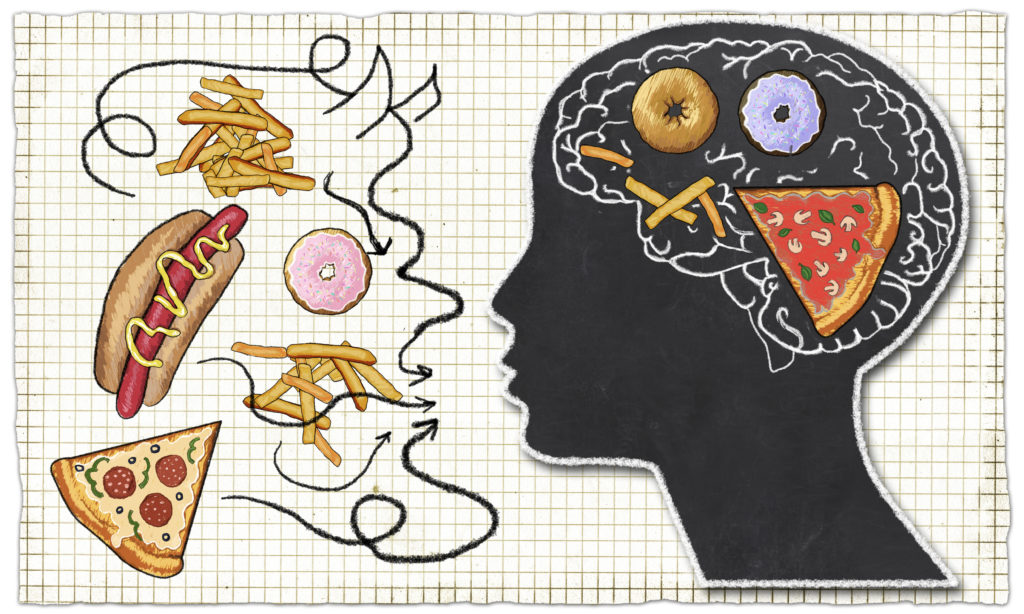Quick Hits
Daily brief research updates from the cognitive sciences

Is weight loss all in the mind?
Well, with the danger of oversimplifying a complex topic, this latest research shows it is, and shows precisely how and with what networks. So, what did these researchers find?
The goal of this study was to measure the effectiveness of a behaviour-based (a good old-fashioned diet with restriction of calories) weight loss intervention. This was carried out by Jonathon Burdette and his team – they had previously identified two networks that are related to weight loss. These, called Functional Network 1 and 2 in this study (FN1 or FN2) with FN1 a network related to sensory and motor control and FN2 related to attention and cognitive control.
Participants were scanned in resting state (while doing nothing) and then after completing a food-cue task. They then completed a 6-month programme for weight loss and their results measured and then compared to their brain scans. What did they find?
They found that those who failed to lose weight had higher activity in FN1 in the resting state and lower activity in FN2 after the food-cue task. This may not sound clear but what it actualyl suggetss is those who had trouble losing weight had a higher natural desire to search out and find food in a resting state combined with inhibited or lower emotional regulation, control, and focus in the presence of food.
This therefore suggests that even in resting state the brain is activated differently and rather than a question of simple will power, it is different neural activation patterns – which may be less of a problem “in the wild” but in modern society when there are food cues everywhere, this can be obviously problematic.
The researchers don’t give any tips at this stage, but it is a step forward in understanding some of the challenges and dynamics of weight loss and getting obese in the first place. It also shows that a more individualised approach is necessary because individuals face different challenges.

Andy Habermacher
Andy is author of leading brains Review, Neuroleadership, and multiple other books. He has been intensively involved in writing and research into neuroleadership and is considered one of Europe’s leading experts. He is also a well-known public speaker speaking on the brain and human behaviour.
Andy is also a masters athlete (middle distance running) and competes regularly at international competitions (and holds a few national records in his age category).
Reference
Jonathan H. Burdette, Mohsen Bahrami, Paul J. Laurienti, Sean L. Simpson, Barbara J. Nicklas, Jason Fanning, W. Jack Rejeski.
Longitudinal relationship of baseline functional brain networks with intentional weight loss in older adults.
Obesity, 2022; 30 (4): 902
DOI: 10.1002/oby.23396
More Quick Hits
Why Thinking Makes You Tired
Quick HitsDaily brief research updates from the cognitive sciences e all know that feeling of having engaged in hard cognitive, thinking, tasks, and feeling tired. If it goes on long enough, we may feel mentally fatigued, drained, or even...
Your Job Can Protect You From Cognitive Decline
Quick HitsDaily brief research updates from the cognitive sciences f you have the right job that is. First let’s understand what the researchers were investigating. There is something strange going on with Alzheimer’s - we know that in Alzheimer’s...
How Nature Is Good For Your Health
Quick HitsDaily brief research updates from the cognitive sciences have reported multiple times how nature is good for your health. For example, in my article on the simple benefits of walking I also show how nature helps in multiple ways such a...
Do Your Chores, You’ll Live Longer – And Better!
Quick HitsDaily brief research updates from the cognitive sciences o, I haven’t been paid to write this by irate spouses or parents! Fact is doing the chores could be very beneficial to your wellbeing. How so you may ask? Well, I admit I have...
Why Having a Hit Reduces Creativity
Quick HitsDaily brief research updates from the cognitive sciences n music this happens often – a band lands a hit but then fails to do anything special again. A well-known occurrence with hits like Tequila in 1958 being the ultimate one-hit wonder...
The Surprising Results Of How Music Reduces Pain in Your Brain
Quick HitsDaily brief research updates from the cognitive sciences hen you’re in pain any form of relief is welcome – we tend to immediately revert to pain killers but there are many other methods of, at least, reducing pain. I have recently...






